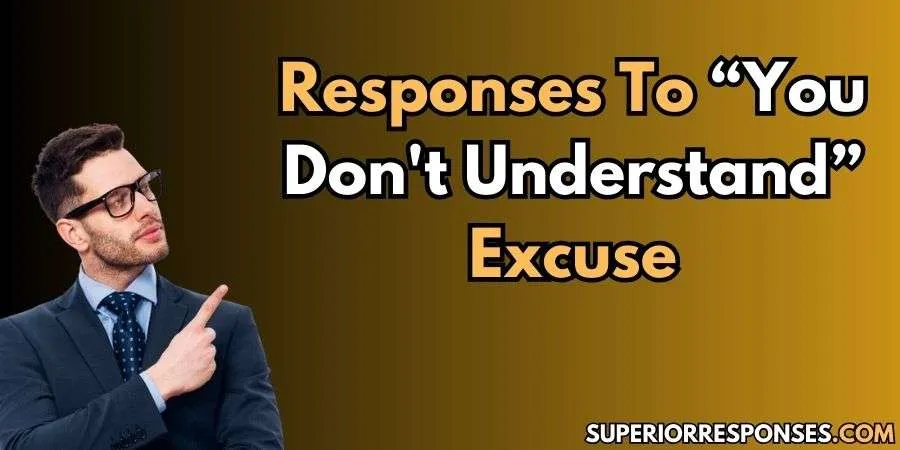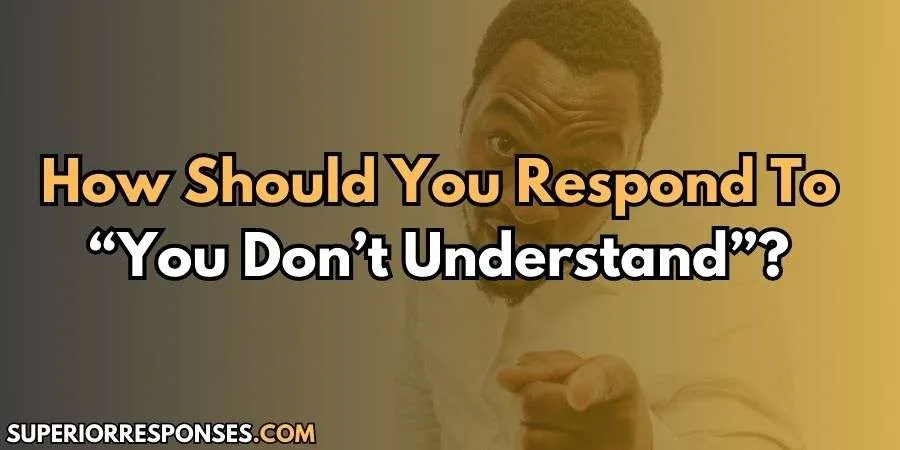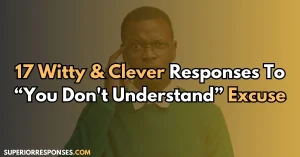As a grown-up, when a kid or partner in the house utters ‘You don’t understand’, it’s often a final try to excuse their hesitation to discuss. Parents or elder siblings still hesitate to ask further, fearing they lack the level of understanding required.
It means they don’t want to talk, not sure how to convince you or say ‘You won’t understand’. This case is sometimes a cleverly treat to family dynamics where replying well is key.
In these moments, You can choose how to answer. You might be gentle and loving, use a funny joke, say something sarcastic, or answer romantically. Your words mirror your feelings and can change the mood of the conversation.
Contents
- 1 Responses To “You Don’t Understand”
- 1.1 Affectionate Responses
- 1.2 Sarcastic Responses
- 1.3 Humorous Responses
- 1.4 Romantic Responses
- 1.5 How Should You Respond To “You Don’t Understand”?
- 1.6 FAQs (Frequently Asked Questions)
- 1.6.1 1. What should I do if someone says “you don’t understand” in an angry or frustrated tone?
- 1.6.2 2. What should I do if someone shuts down the conversation after saying “You don’t understand”?
- 1.6.3 3. What if I genuinely don’t understand?
- 1.6.4 4. How can I avoid saying “you don’t understand” myself?
- 1.7 Final Thoughts
Responses To “You Don’t Understand”
Affectionate Responses
1. I may not fully grasp it yet, but I’m here to listen and learn from you.
Hey, I hear you. It’s like you’re saying, ‘You’re not getting this, not really.’ And that’s okay. I really am here and prepared to hear you out.
Let’s sit down, no rush. Tell me everything. Your words, matter. Every bit of them.
2. I’m here to listen, your voice matters to me.
When you say, You don’t get it, it hits home. But here’s the thing: I’m listening.
Sit with me. Let’s toss the clock aside. No hurrying, no skipping. Just you, your words, your silence, all welcomed.
It’s not just about hearing you, it’s about feeling every bit of what you’re sharing.
3. I want to understand what’s in your heart.
Come, let’s find a cozy spot. No distractions, just us. Share with me, slowly, in your way, what’s brewing inside.
Your experiences, your dreams, your fears, they matter. They shape you, and I want to understand that and feel that with you.
4. You’re right, and I want to. I want a guide through your thoughts.
It’s polite, it shows you care, and it invites the other person to share more, making it easier for both of you to understand each other better.

Sarcastic Responses
1. You’re right, I don’t understand how you’re still confused.
You have this unique talent for making simple things seem like rocket science. It’s not rocket science, though.
It’s just you, lost in the sauce, while the rest of us are wondering if you need a map and a flashlight to find your way out of your own confusion.
2. My bad, I forgot you wrote the book on this.
Oh, of course, how could I forget? You’re the grand master, the guru, the all-knowing oracle of this topic. Here I was, foolishly thinking I had a grasp on things, but no, you’ve obviously got chapters in the library of knowledge dedicated to this.
Your book, ‘Cluelessness for Dummies’, must be a bestseller in the world where up is down and left is right. It’s amazing how you manage to know so little about so much.
3. Oh, I’m sorry, I thought we were using common sense.
My deepest apologies. I mistakenly assumed we were operating on the same wavelength where common sense is, you know, common.
But no, you’re on a whole different frequency, one where sense is as rare as a camel in a city bus.
4. My apologies, I don’t speak your version of English.
I didn’t realize we were conversing in a dialect of English known only to you, where words mean whatever you want them to.
Your version of English is like a secret code, only there’s no decoder ring because even the ring gave up trying to understand you.
SUGGESTED: 37 Slick Responses to ‘Don’t Tell Me’ (Master the Moment!)
Humorous Responses
1. You’re right, I don’t understand. I’m still waiting for the user manual on life.
Ah, the eternal wait for life’s instruction booklet! Imagine if life came with a manual. Chapter 1: How to Adult. Chapter 2: Why Do Socks Always Go Missing in the Laundry? Spoiler alert: there is no Chapter 3 because who reads past Chapter 1 anyway?
This response is the adult version of ‘My dog ate my homework.’ Classic procrastinator’s line – waiting for a manual that’s probably stuck in cosmic mail.
2. I’m fluent in over six million forms of confusion.
Now this is a skill! Fluent in confusion is like being a Jedi master of misunderstandings. It’s not just regular confusion; it’s an art form. Like, ‘What makes us drive on a parkway and park in a driveway?’
Kind of makes you wonder if they secretly majored in dismay at the University of I-Have-No-Idea-What’s-Going-On.
3. Give me a second, my understanding is buffering.
Ah, the human brain on a slow internet connection. This line paints a picture of someone standing there, eyes glazed over, with that spinning circle of doom in their eyes.
You can almost hear the dial-up internet sound from the 90s. It’s like trying to stream a movie on a toaster. Just give it a second… or maybe a year.
4. Understand? I’m still trying to spell it correctly.
This one’s great for a light self-deprecating laugh. It’s like saying, ‘Hey, I’m struggling with the basics here, give me a break!’ It works well in informal, relaxed settings where everyone’s just having a good time.
It’s a humble and humorous way to admit that the topic at hand is a bit over your head.
5. I left my understanding in my other brain.
This is a classic ‘oops’ moment response. Use it to inject a bit of surreal humor into the conversation. It’s like saying, ‘If only I had my other brain with me, the one that handles the hard stuff!’
It’s perfect for those moments when you want to acknowledge your confusion without getting too serious about it.
Romantic Responses
1. Help me understand, as knowing you more is what I desire most.
Love’s about understanding, right? When they say, You don’t understand, it’s like a door creaking open, inviting you in.
This response? It’s your way of stepping through that door. It’s saying, ‘Hey, I’m here, I’m all in. I want to get you, every little bit.’
2. I may not get it, but I get us.
It’s acknowledging, ‘Okay, I might be missing something here.’ But it’s also saying, ‘What do we have? That’s clear as day to me.’
It’s romantic because it’s not about being perfect. It’s about being present.
3. Teach me about you, I’m your dedicated student.
Oh, this one’s a heart-melter. You’re saying, ‘I’m ready to learn every chapter of your story.
It’s like sitting down with a book you just can’t put down. That’s how you see them. Fascinating.
4. I’m ready to learn if you’re ready to teach.
This one’s all about partnership. It’s a two-way street. You’re saying, ‘Guide me into your world.’ It’s an invitation for them to share, to open up. That’s what love’s about, right?
Sharing worlds. It’s like you’re both dancing a dance only you two know, and you’re saying, ‘Lead the way, I’ll follow.’
5. I’m lost in you, and I don’t mind.
You’re embracing them. It’s romantic in its surrender.
It says, ‘Your complexities, your intricacies, they’re not obstacles. They’re what draw me closer.’
How Should You Respond To “You Don’t Understand”?
Responding with Empathy and Understanding
In a scenario where someone says ‘You don’t understand’, it’s crucial to respond with empathy. Taking a deep breath and adopting a soothing tone can prevent the conversation from escalating.
Acknowledge their feelings with phrases like ‘I understand’ or ‘I’m not sure I follow’. This shows you’re willing to listen and hear their perspective, fostering a calm environment.

By asking clarifying questions and showing genuine interest, you might get a clearer picture of their emotions and experience, finding common ground even if you don’t agree eye to eye.
Maintaining Respect and Boundaries
When discussing tricky topics, it’s important to know your boundaries and respect theirs. If the situation feels disrespectful or dismissive, it’s okay to take control of your reaction and walk away.
Alternatively, expressing empathy and validating their tough time can connect you on a deeper level. It’s about being open and honest, yet gently guiding the conversation toward a productive outcome.
Remember, it’s not always about trying to convince or believe but about being willing to discuss and relate.
READ MORE: 85 Best and Unique Responses to “Good for You”
FAQs (Frequently Asked Questions)
1. What should I do if someone says “you don’t understand” in an angry or frustrated tone?
When someone says “you don’t understand” in a frustrated or angry tone, Acknowledge their feelings first. Take a deep breath, and in a calm voice, tell them you hear them and understand their frustration.
Ask for clarification to be sure you’re getting their perspective right. This approach can de-escalate the situation, helping build common ground and agreement to move the conversation forward without becoming defensive.
2. What should I do if someone shuts down the conversation after saying “You don’t understand”?
In response, connect with their perspective, offer space, and listen; if they remain dismissive or disrespectful, it’s wise to walk away and control your response.
An open and respectful talking environment sometimes needs boundaries when someone reacts harshly to being spoken to.
3. What if I genuinely don’t understand?
If you’re not sure or afraid that you don’t understand, it’s okay to ask clarifying questions. This shows you’re genuinely interested in gaining a clearer picture and willing to communicate to know the other’s perspective.
Trying to understand differently or asking for a follow-up can explain things better and show your genuine interest in understanding, even if you don’t agree.
4. How can I avoid saying “you don’t understand” myself?
Embrace active listening and pay full attention to gain another’s perspective; ask open-ended questions that encourage the sharing of thoughts and feelings in detail.
Avoid jumping to assumptions or conclusions, be patient, and allow others time and effort to express themselves at their own pace.
Final Thoughts
In discussing tough situations, it’s crucial to talk openly about what happened and how we’re feeling. Trying to force or convince someone to understand can be counterproductive; instead, share your perspective and explain without using it as an excuse.
Remember, not everyone can immediately relate or offer the help you need, but finding common ground in these days of complexity can be a smart way to approach responses.


